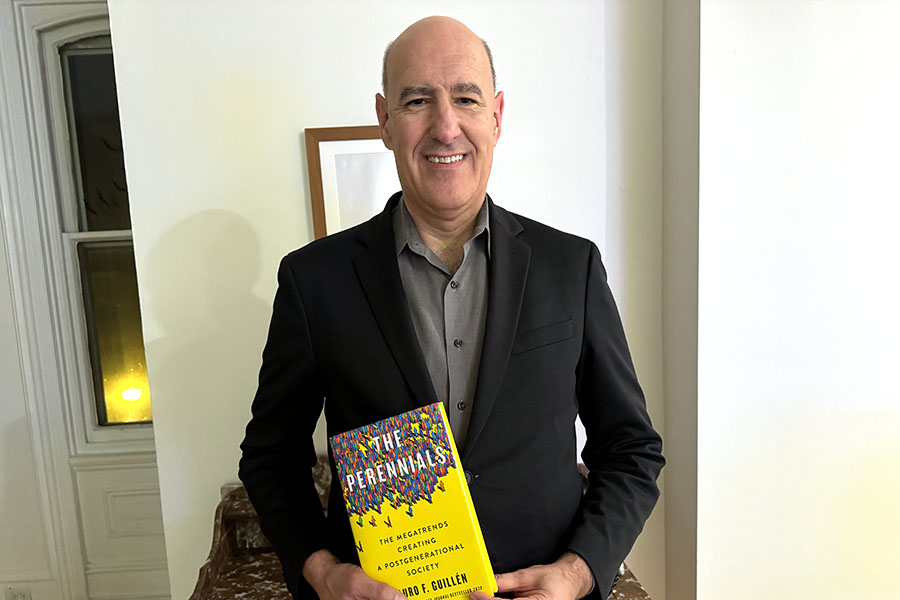
Life is not a series of linear stages defined by age: Mauro F Guillen
In his latest book The Perennials: The Megatrends Creating a Postgenerational Society, author Mauro F Guillén exhorts us to rethink the sequential model of life that has long been almost a norm
 Mauro F Guillén, Author and Vice Dean of the MBA Program for Executives at Wharton School, University of Pennsylvania
Mauro F Guillén, Author and Vice Dean of the MBA Program for Executives at Wharton School, University of Pennsylvania
Governments need to stop classifying people by age group and treating them differently, or segregating them, says Mauro F Guillén. The author of many books, Guillén is also the William H. Wurster Professor of Multinational Management and Vice Dean of the MBA Program for Executives at Wharton School, University of Pennsylvania. Here he talks about the shaping of a post-generational society and its implications for businesses, governments, and society at large.
Q. Could you let us a bit into the book’s back story?
I was giving a zoom seminar during the pandemic. The audience was directors of zoos and aquariums in the US and internationally. They were telling me about how difficult it was to attract people to their parks. Only the grandchildren and the grandparents would go. It dawned on me that the world needed more inter-generational collaboration, more time for generations to spend time together, learning, working, or entertaining themselves.
Q. Who are the ‘perennials’? How different is their course of life?
Perennials are people who don’t think and don’t act their age. They are unconstrained. They learn, they work, and they rest whenever they think is best, moving back and forth between each of those activities. They are the new kind of person that the new economy of the 21st century requires due to technological change and disruption. The economy and companies are asking people to be flexible. But the educational system, the labour market, and the way we structure our lives is far from being flexible. We need a different arrangement that is not the sequential model of life, i.e. first you play, then you learn, followed by work and retirement.
Q. As a multi-generational society takes shape, what’s the kind of mind shift governments and organisations need to make?
They need to stop classifying people by age group and treating them differently, i.e., segregating them. For example, people of all ages should have access to learning and to financial aid for learning. People with a pension fund should be able to use it not just to retire, but also to stop working and learning something new. In the US, you are penalised if you withdraw money from your pension fund before retiring. That must change. It’s better for the country because people who invest in their skills will be able to work longer and thus contribute to the social security fund longer, and not claim a pension until much later in their lives.
Organisations need to change also. They need to appreciate the talent at all ages. They must stop thinking that when a worker turns 50, they must look for ways to get rid of him or her. Some of these changes will take time and will be difficult. But we will start to see that some organisations embrace the perennial model. Once that happens, others will realise its potential. Then the dynamic of competition in the market will kick in. Organisations that do not participate in this perennial market will be neglecting a huge source of talent, and thus sooner or later they will see themselves at a disadvantage in the market.
Also read: Leadership is simply a series of moments: Kirstin Ferguson
Q. As you point out, people may in future pursue multiple careers, not just switch jobs. What changes will this demand in hiring practices?
We live longer. We stay healthy longer. There are fewer young people due to the decline in fertility. Technology makes what we learn obsolete. So in our new, long lives, we will need to go back to school and learn several times. Each of those times, we can choose to switch jobs or to switch careers. This will happen more frequently as time goes by. Companies need to think of older employees as experienced employees they must retain. We all decline cognitively, but as we age, we more than compensate for that loss with our experience. Older workers may not have the mental dexterity of someone in their 20s, but they have experience. That’s why I think AI will mostly help people above a certain age. They have experience which is what’s needed to make the most out of AI. Consider Chat GPT. It rarely gets it exactly right the first time around. The user needs to follow up with questions. Well, older workers have more experience and can thus ask better questions.
The perennial way of life is also better for young people. We put too much pressure on teenagers and those in their 20s. “When are you going to grow up?” “What are you going to do to make a living?” “Can’t you make up your mind as to what job you want to have, which career to pursue?” These are impossible demands. Technology changes everything too quickly, and we live so long that it is daunting to make a decision for so many decades. Instead, we should be telling young people: “Take it easy. One step at a time. Think about the next 10 or 15 years. We don’t know for sure which jobs will be exciting and plentiful beyond that time. Learn how to learn. Be a lifelong learner. Assume that you will need to switch careers at some point. Never think that you should put up with a job you don’t like just because you’ll be able to save for the big prize, retirement.”
Q. What are the perks of age diversity at the workplace?
As I said above, technological change is inviting us to be lifelong learners. But the educational system classifies people by age, and if you don’t take advantage of it at the appropriate age, then you are out. This has to change. In the workplace, we see that age-diverse teams perform better and are more creative. Lifelong learning is not only better for the economy and for companies because the labour market then will offer the skills they need. It’s also good for the individual workers. As human beings, we like to learn. But right now we are told: “Study hard and learn everything you can while you are at school and before you start to work, because this is your only chance to learn.”
Also read: The key is to stop thinking of older adults as one market: Susan Wilner Golden
Q. What will a multigenerational consumer market mean for businesses?
Like with jobs, age is becoming less relevant in consumer markets. A 60 or 70- year-old today has a very active lifestyle compared to someone of the same age half a century ago. Thus, we no longer have “young” and “old” consumers. We have consumers with different lifestyles. All consumer products need to be adjusted, and especially marketing, the way companies persuade people to buy their products. Most marketing is aimed at people in their 20s, 30s, and 40s. But today the largest segment in terms of purchasing power is people above age 50. By 2030, it will be people above age 60. Financial services will also change. As people live longer, their time horizon shifts, and so will financial products.
Q. Three skills critical to succeed in the future job market…
Have a Perennial mindset in which age is not an obstacle to anything. Have the ability to unlearn, re-learn, and learn something new. Be open-minded about learning and working with others. That’s the future of the workplace and of education. It’s a future in which people will be moving back and forth between school and work. Generations will collaborate and also learn, work, and rest together. That will be good for society because right now we have too many frictions between generations.

















